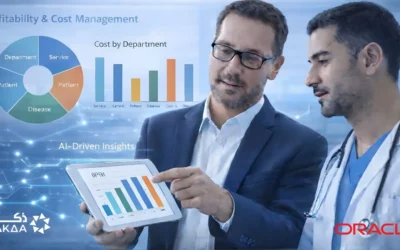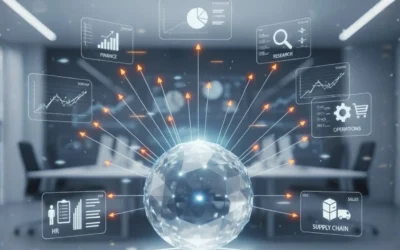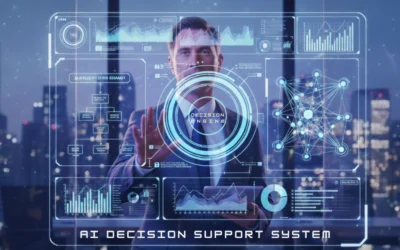“The future belongs to those who prepare for it today.”
The Fourth Industrial Revolution (4IR) – a new chapter in human development – changed how the world works. For the Arab world, it presents both challenges and opportunities. From AI-powered smart cities to advanced robotics, countries in the region are now embracing technologies that will diversify economies, improve public services, and transform industries.
This article will take you through the what, how, and why of 4IR and its role in reshaping the future of the Arab region.
What You’ll Learn in This Article
- What is the Fourth Industrial Revolution (4IR)?
- Key technologies shaping the Arab world.
- The benefits and challenges of adopting 4IR technologies.
- Real-world examples from Saudi Arabia, UAE, Oman, and more.
- How 4IR will shape the future of the region.
What is the Fourth Industrial Revolution (4IR)?
The Fourth Industrial Revolution is the combination of digital, physical, and biological ecosystems to transform industries and societies. It builds on the advances of past industrial revolutions:
Historically, the Industrial Revolution marked a significant transition from an agricultural and manufacturing-based economy to an industrial one. Navigating the timeline of the revolution the important breakthrough included:
- First Industrial Revolution.
Known for the introduction of steam engines. This era saw the mechanization of industries, where labor and machinery collaborated to enhance production.
- Second Industrial Revolution.
With the invention of electricity, industries experienced mass production and increased efficiency. Applications included telecommunications, such as telegraphs, radios, and telephones.
- Third Industrial Revolution.
This phase focused on the digitalization of industries, emphasizing the automation of manufacturing processes. The internet revolutionized business operations, making them more efficient, interconnected, and intelligent.
- 4IR
Takes things a step further—combining AI, robotics, the Internet of Things (IoT), and cloud computing to create smarter, more autonomous systems that learn and adapt without human intervention. The combination of three worlds – physical, digital, and biological – where everyone is talking with everyone.
How 4IR is Shaping the Arab World
Arab countries, especially Saudi Arabia, UAE, and Qatar, are at the forefront of the 4IR wave. Governments are investing heavily in AI, IoT, and robotics to drive economic growth and reduce their reliance on oil. Smart city initiatives, fintech startups, and AI research programs show how the region transforming the economy and society.
🔆 Saudi Arabia: The government’s Vision 2030 includes a $20 billion investment in digital transformation, to build a diversified economy powered by advanced technologies.
🔆 UAE: Dubai and Abu Dhabi are leading the way with smart cities, blockchain-based property transactions, and AI-powered public services.
🔆 Qatar: The Msheireb Smart City project leverages big data to optimize urban planning and improve residents’ quality of life.
Key Technologies of 4IR in the Arab Region
↳ Artificial Intelligence (AI): AI helps businesses automate tasks, make better decisions, and improve efficiency. Example: In Jordan, Altibbi offers an online healthcare platform, improving access to medical services.
↳ AI Chip Factories in Saudi Arabia: The AI chip manufacturing facilities are crucial for supporting local tech development and reducing dependency on imports. Example: SAMI (Saudi Arabian Military Industries) initiative, which includes plans for developing advanced semiconductor technologies that support defense and other civilian uses.
↳ Internet of Things (IoT): IoT devices collect real-time data, helping cities and industries optimize operations. Example: Dubai’s smart parking system uses IoT to guide drivers to available spaces, reducing traffic congestion.
↳ Robotics and Automation: Robots now perform tasks like manufacturing, service delivery, and even folding laundry! Example: Emirates NBD uses robotic process automation (RPA) to improve customer service and back-office processes.
↳ Cloud Computing: Cloud solutions allow businesses to operate remotely and efficiently by storing and sharing data in real-time. Example: Dubai Cloud powers government services, reducing costs and enhancing efficiency.
↳ Business Intelligence: BI tools enable organizations to analyze data and derive insights that inform strategic planning. Example: Saudi Aramco, uses BI systems to monitor operational performance, manage resources, and make data-driven decisions, enhancing overall efficiency and competitiveness in the global market.
↳ Enterprise Resource Planning (ERP) and Enterprise Performance Management (EPM): These systems simplify business operations, improve resource allocation, and enhance overall efficiency. Example – Qatar Airways uses an ERP system to rationalize its operations across various departments, including finance, supply chain, and human resources. The airline also employs EPM solutions to monitor and analyze financial performance, track key performance indicators (KPIs), and support strategic decision-making.
↳ Virtual Reality (VR) and Augmented Reality (AR): These technologies enhance training, marketing, and customer engagement by providing inclusive experiences. Example: The Museum of the Future in Dubai offers immersive VR experiences that allow visitors to explore futuristic concepts, such as traveling through time or envisioning life on other planets.
↳ Autonomous Vehicles: The development of self-driving technology is focusing on revolutionizing transportation and logistics in the region. Example: Dubai’s self-driving taxis, which are part of the city’s broader strategy to integrate smart transportation solutions.
Why 4IR is Important for the Arab World
🟠 Economic Growth – it will boost productivity, driving economic growth. Through automation and enhanced efficiencies, nations can increase output while utilizing fewer resources. For instance, data analytics and automation have helped Saudi Aramco improve its operational efficiency.
🟠 Transformation – this may lead to unemployment however it also generates new positions that demand advanced skills. This transformation requires the workforce to undergo reskilling and upskilling to meet with the needs of a technology-driven economy. For example, automation in the banking sector of UAE. AI and machine learning for customer service and transaction processing, roles.
🟠 Innovation – The technology drives innovation across various sectors. This enables companies to create new products and services, enhancing their competitiveness and ability to respond to market demands. In Oman, a notable example of technological advancement driving innovation is the growth of the fintech sector. Companies like Thawani and Fatoora are leveraging digital payment solutions and mobile banking technologies to transform financial services.
🟠 Global Competition – countries that can adapt to the 4IR technologies are able to gain that competitive advantage can draw foreign investment and increase trade opportunities. NEOM project exemplifies how embracing 4IR technologies can create a competitive advantage that attracts foreign investment and enhances trade opportunities in Saudi Arabia.
🟠 Sustainability – Technologies from the Fourth Industrial Revolution can promote more sustainable practices, including improved resource management and waste reduction, helping to tackle global challenges like climate change. In Kuwait, the implementation of smart water management systems serves as an example. These systems use IoT technology to monitor water usage and detect leaks in real-time, significantly reducing waste.
Current Landscape of Digital Transformation in the Arab Region
The current state of digital transformation in the Arab region reflects considerable progress alongside notable challenges. Here are some key highlights:
🔆 Government Initiatives: Multiple Arab nations have implemented national strategies to advance digital transformation. For example, the UAE’s Vision 2021 and Saudi Arabia’s Vision 2030 lay out ambitious frameworks for integrating technology across diverse sectors, including healthcare, education, and public services.
🔆 Startup Ecosystem: The region is witnessing a burgeoning startup ecosystem, particularly in cities like Dubai, Riyadh, and Cairo. Tech startups are focusing on fintech, e-commerce, and health tech, contributing to economic diversification. Saudi Aramco Ventures’ $1-3 billion Prosperity7 fund for transformative startups, and STC’s investment of $1 billion in MENA HUB to create a regional center for cloud and digital services.
🔆 Digital Literacy and Skills Gap: Despite progress, a digital skills gap remains. Initiatives are in place to reskill and upskill the workforce. In Dubai, initiatives like the Dubai Future Academy aim to reskill and upskill the workforce in emerging technologies.
🔆 Emerging investments- A notable example of growing investment due to the Fourth Industrial Revolution in Arab countries is the Dubai Artificial Intelligence (AI) Strategy. Launched in 2017, this initiative aims to position Dubai as a global leader in AI by attracting investments in AI technologies.
Challenges of Adopting 4IR Technologies
❗ Digital Skills Gap: There is a significant shortage of skilled workforce trained in advanced technologies like AI, IoT, and data analytics, hindering the effective implementation of 4IR solutions.
❗ Infrastructure Restraints: Many Arab countries face inadequate digital infrastructure, including unreliable internet connectivity and insufficient technological facilities, which can be a barrier to the adoption of advanced technologies.
❗ Regulatory Barriers: Complex regulatory environments and bureaucratic processes can slow down innovation and make it difficult for businesses to adopt modern technologies.
❗ Financial Limitations: Limited access to funding and investment for startups and small businesses can restrict their ability to invest in 4IR technologies.
❗ Cultural Resistance: There may be resistance to change among traditional businesses and workforces, who might be hesitant to embrace modern technologies due to fear of job displacement or uncertainty about their effectiveness.
❗ Cybersecurity Concerns: As digital transformation progresses, the risk of cyber threats increases, creating a need for strict security measures that many organizations may not yet have in place.
❗ Inter-operability Issues: The lack of standardized protocols and systems can lead to difficulties in integrating modern technologies with existing infrastructure, complicating the adoption process.
❗ Economic Diversification Challenges: depending on traditional sectors, such as oil and gas, may slow the transition to a more diversified, technology-driven economy.
Looking Ahead: The Future of 4IR in the Arab World
The Fourth Industrial Revolution presents a chance for the Arab world to lead in technology and innovation. With strategic investments and the right policies, the region can reduce its dependency on oil, attract foreign investment, and create sustainable growth opportunities.
The journey will require collaboration, continuous learning, and innovation, but the rewards are worth the effort. Countries that adopt 4IR technologies will gain a competitive edge, create jobs, and improve the quality of life for their citizens.
In the next decade, we’ll see more smart cities, automated industries, and sustainable energy solutions emerging across the region. Digital infrastructure will improve, and governments will focus on reskilling the workforce to meet the demands of the future economy.
4IR is about more than just technology-driven change; it is an opportunity to help everyone, including leaders, policy-makers, and people from all income groups and nations, to use next-generation technologies in a way – to create an inclusive, human-centered future. The question is not whether to adopt 4IR—but how fast can it be done?
Are you ready to embrace the future?
Get in touch with Diamond Professional Consultants. Today data is the new currency that’s why – we make data work for you, not against you.
“Because when you see your business clearly, you can lead it confidently” – Hatem Elkady, CEO of Diamond.
Founded in 2012 in the UK, We started turning Business Data into Insights & Right Decisions – Faster! With our AI, Oracle EPM, BI, Data Analytics & Data Science services.
Let us help you harness the power of 4IR in your business future.
📞 Get a Free Consultation Today:
📱 +202 383 614 87 | Mobile: +2011 522 722 29
🌐 Visit us at Diamond-DPC.com





